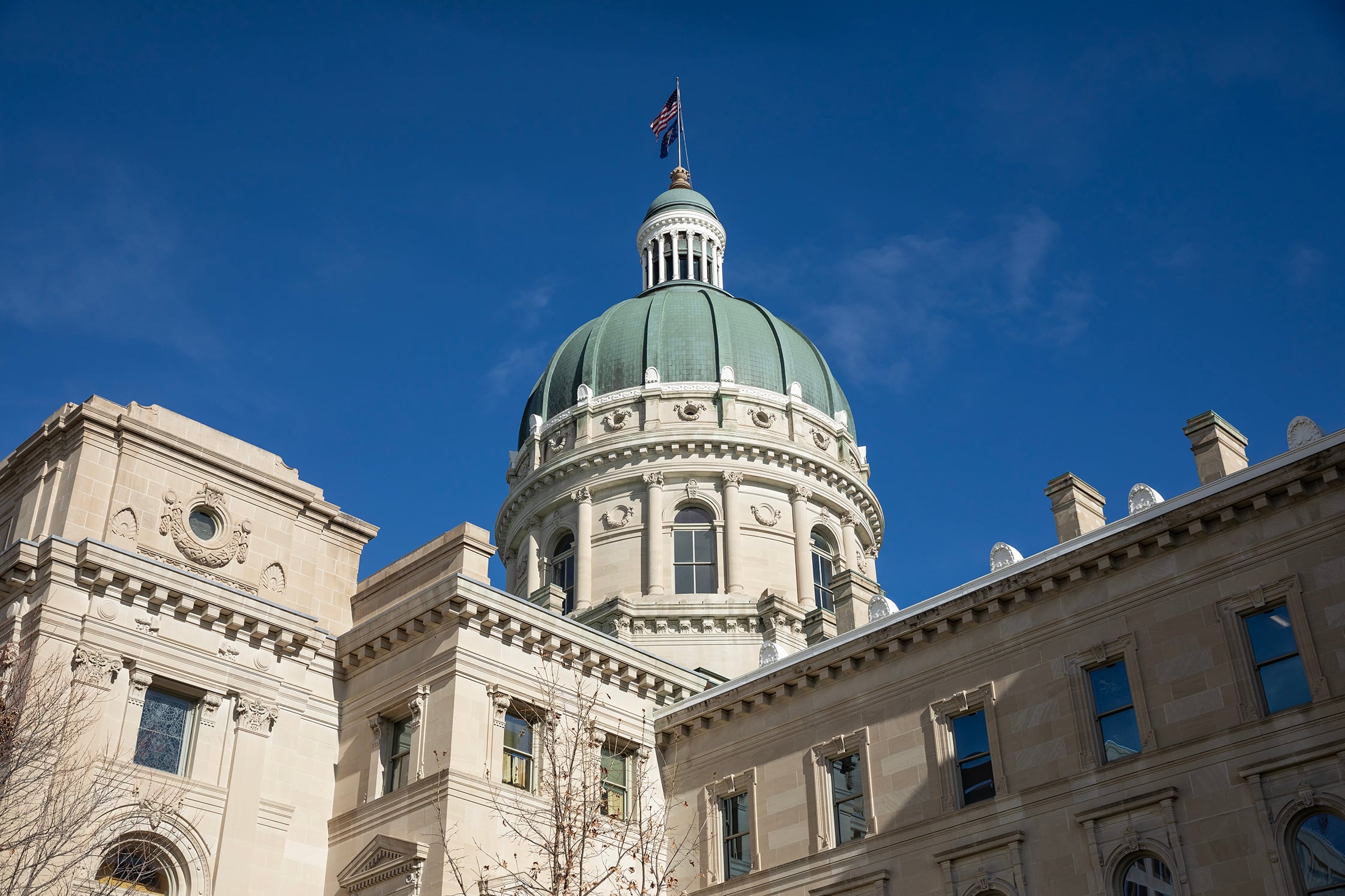Sign up for Chalkbeat Indiana’s free daily newsletter to keep up with Indianapolis Public Schools, Marion County’s township districts, and statewide education news.
This article was originally published in the Indiana Capital Chronicle.
A sweeping bill tightening lawmaker oversight of Indiana’s public colleges and universities for “intellectual diversity” purposes drew opposition Tuesday in the Senate but easily cleared the chamber along party lines.
“The number of Hoosier students and parents who view higher education as monolithic echo chambers — (that) coddle students with minority but scholarly viewpoints or ostracize faculty … or students with different viewpoints — is significant,” Sen. Spencer Deery said on the Senate floor.
Deery has called his Senate Bill 202 a “reform” effort intended to reverse those “declining views” of higher education.
“Infringing on academic freedom is a red line we should not cross, but we don’t need to give up on these values to curb the excessive politicalization and viewpoint discrimination that threatens our state’s workforce goals,” he said.
Opponents, however, argued the proposed changes could harm students and faculty members, or would overly burden public institutions.
Those include Ball State University, Indiana University, Indiana State University, Ivy Tech Community College, Purdue University, the University of Southern Indiana, and Vincennes University.
Senators passed the legislation in a party-line vote of 39-9, with all Democrats voting against.
On Wednesday, Indiana University President Pamela Whitten said in a statement that the bill risks unintended consequences for both the university and the “economic and cultural vitality of the state.”
“While we are still analyzing the broad potential impacts of SB 202, we are deeply concerned about language regarding faculty tenure that would put academic freedom at risk, weaken the intellectual rigor essential to preparing students with critical thinking skills, and damage our ability to compete for the world-class faculty who are at the core of what makes IU an extraordinary research institution,” Whitten said in her statement.
Polling students and tweaking boards
Deery and other Republican lawmakers contend that conservative students and faculty members are increasingly ostracized at progressively liberal college and university settings — or at least perceive such shunning.
“Even if some of it is perception, that still matters if it keeps a kid from enrolling in higher (education) or keeps their parents from encouraging them to do so,” Deery said. “Higher (education) should be for all Hoosiers.”
In a 2023 state-commissioned survey of thousands of Hoosier higher education students, about 56% said conservative students can openly express their opinions at school, compared to the 73% who said liberal students can do so. More than 25% of respondents — for both questions — said they were neutral or didn’t know an answer.
Deery’s bill would change up institution boards of trustees by removing appointment power from alumni councils and handing it to House and Senate Republican majority leaders — “with advice” from Democrat minority leaders. It would require boards’ existing diversity committees to consider “intellectual diversity” alongside cultural diversity in employment policies and faculty complaints.
And it would require the committees to make recommendations promoting recruitment and retention of “underrepresented” students rather than the “minority students” specified in current law. That provision drew ire from Minority Leader Greg Taylor, D-Indianapolis.
“To … redefine the term ‘minority’ and call them ‘under-represented’ without addressing their issue is offensive,” said Taylor, who is Black. He said both he and his son had been called the n-word as students on I.U.’s campus decades apart.
“The amount of minorities, Black students, going to universities has never been so low,” Taylor added. “… These students still struggle to have the same rights on campus as your conservative students do — and it’s not because of their political views or their ideologies. It’s simply because of an inalienable trait that they had nothing to do with.”
Deery noted his legislation didn’t end existing diversity initiatives and said his single bill couldn’t address every problem. He added that “overwhelmingly” non-white students struggling to access their transcripts are expected to benefit from legislation he authored last session.
‘Abolishing’ tenure?
Deery’s bill additionally re-shapes tenure and promotion policies.
It would require a board of trustees to prevent a faculty member from getting tenure or a promotion if the board thinks the member is “unlikely to foster a culture of free inquiry, free expression and intellectual diversity” and unlikely to offer students scholarly works from a range of “political or ideological frameworks.” Boards would also dock members considered likely to bring up personal political views unrelated to their specific field or class.
Boards would get wide latitude in making those policies. The bill says decisions would be based on past performance “or other determination by the board.”
The bill also mandates that boards conduct reviews of tenured professors every five years based on the above, as well as if faculty members “adequately” carry out academic duties and more. A fiscal analysis by the nonpartisan Legislative Services Agency notes I.U.’s main campus at Bloomington alone has over 1,000 tenured faculty, meaning its board would have to conduct 200-plus reviews annually.
Deery said he sought to protect tenured faculty by codifying things the board can’t consider in reviews: expressing dissent or engaging in research and public commentary, criticizing institutional leadership, and engaging in political activity outside teaching or mentoring duties.
But institutions would be required to adopt policies establishing disciplinary actions — termination, demotion, salary cuts, and more — for tenured faculty members who fail those reviews.
“Some I have heard from in my community feel that it is abolishing tenure,” said Sen. Shelli Yoder, D-Indianapolis. She said the legislation could have a “chilling effect.”
Deery countered that schools like Indiana State University already have post-tenure reviews, and called them “not a new concept.”
His bill additionally requires institutions to establish complaint procedures in which school students and staff can accuse faculty members and contractors of not meeting free-expression criteria.
Institutions would have to refer those complaints to human resource professionals and supervisors “for consideration in employee reviews and tenure and promotion decisions,” according to the bill. They’d also have to keep their boards of trustees in the loop and send complaint-related information to the Indiana Commission for Higher Education (CHE) for a report.
Later, the legislation indicates that petitioners unsatisfied with the results of their complaints can get CHE’s commissioner to consider their requests, and guarantees a “final order” within 60 days of receipt.
Democrats pushed back against the bill’s provisions, even as they acknowledged its intent.
“… Senate Bill 202 actually is stifling diversity and debate of differing views, and it will hurt the recruitment of high quality professors, high quality students and the ability to attract and to keep our students and to prepare them for the workforce,” Yoder asserted.
She said the bill is “tying the hands of universities” and called it “heavy-handed.”
Chalkbeat Indiana reporter Aleksandra Appleton contributed to this article.
Indiana Capital Chronicle is part of States Newsroom, a network of news bureaus supported by grants and a coalition of donors as a 501c(3) public charity. Indiana Capital Chronicle maintains editorial independence. Contact Editor Niki Kelly for questions: info@indianacapitalchronicle.com. Follow Indiana Capital Chronicle on Facebook and Twitter.





